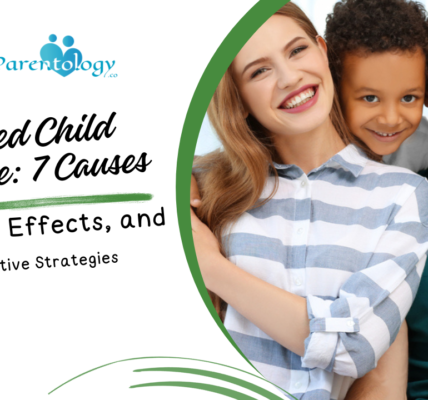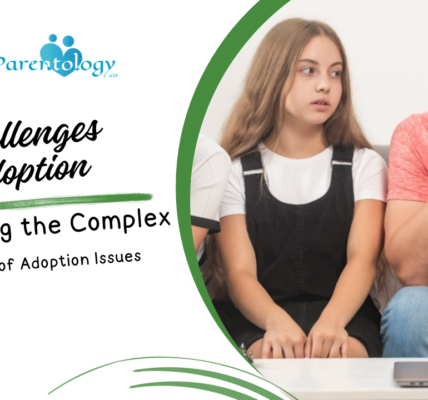Understanding and Nurturing Adopted Children’s Emotional Well-being: 10 Essential Insights and Strategies
Adopted children undergo unique challenges that can affect their psychological well-being. Understanding these challenges is crucial for parents and caregivers to provide appropriate support. Here’s a detailed exploration of the 10 most common psychological problems encountered by adopted children.
Psychological Effects of Being Adopted at Birth
Adoption, while a loving choice, can introduce psychological complexities in a child’s life, especially when they’re adopted at birth. The sudden shift from a familiar environment to an unknown one can instigate various emotional responses.
Understanding & Strategies for the Emotional Journey of Adopted Children
Understanding these psychological challenges is pivotal in providing appropriate support and guidance to adopted children.
1. Identity Confusion and Self-Esteem Issues
Description: Adopted children often grapple with a deep-seated curiosity about their biological origins, leading to questions about identity. This quest for understanding where they come from might create emotional turmoil, impacting their self-esteem and sense of belonging. It’s essential for parents to foster an environment where open conversations about adoption are encouraged, helping the child navigate their identity journey with support and acceptance.
Strategies for Parents and Caregivers:
- Emphasize the uniqueness of their adoption story, fostering a sense of pride and individuality.
- Encourage discussions about their birth story in an age-appropriate manner.
- Seek resources or support groups to assist the child in exploring their roots.
- Validate their emotions and provide reassurance about the love and security within the adoptive family.
- Consider therapy or counseling to navigate identity-related challenges with professional guidance.


2. Attachment and Trust Issues
Description: Disruption in early attachment due to adoption might lead to difficulties in forming trusting relationships. Adopted children may struggle to build secure bonds due to prior experiences of loss or separation. Parents need to create a safe and nurturing environment where the child feels emotionally secure and learns to trust their caregivers.
Strategies for Parents and Caregivers:
- Foster consistency and reliability in caregiving to establish a sense of security.
- Practice responsive parenting to meet the child’s emotional needs promptly.
- Engage in bonding activities that promote trust and closeness.
- Allow the child to express their emotions freely without judgment.
- Seek guidance from professionals specializing in attachment-based therapies if needed.
3. Behavioral Challenges
Description: Some adopted children may exhibit behavioral challenges resulting from unresolved emotional trauma. These challenges might manifest as aggression, withdrawal, or difficulty in regulating emotions. Understanding the underlying emotional triggers is crucial in addressing and managing these behaviors effectively.
Strategies for Parents and Caregivers:
- Employ positive discipline techniques that focus on teaching and guiding rather than punitive measures.
- Create a structured routine and environment that promotes predictability.
- Encourage healthy outlets for emotional expression, such as art, play, or therapy.
- Collaborate with mental health professionals to develop tailored strategies for managing behaviors.
- Provide consistent and empathetic support to help the child navigate emotional challenges.
4. Anxiety and Depression
Description: Feelings of abandonment or a sense of loss may contribute to anxiety and depression in adopted children. The fear of rejection or the unknown might trigger emotional distress. Parents should create a safe space for the child to express their emotions and provide reassurance and stability.
Strategies for Parents and Caregivers:
- Foster a nurturing environment with open communication and emotional validation.
- Teach coping skills and relaxation techniques to manage anxiety symptoms.
- Encourage healthy lifestyle habits like regular exercise, balanced nutrition, and adequate sleep.
- Seek professional guidance and therapy to address anxiety or depressive symptoms.
- Promote activities that boost self-esteem and resilience in the child.


5. Grief and Loss
Description: Even in loving adoptive families, adopted children may experience grief and a sense of loss. They might grieve for their birth family or feel a loss of their identity, which can impact their emotional well-being. Parents need to acknowledge and validate the child’s feelings of loss while providing reassurance and support.
Strategies for Parents and Caregivers:
- Create an open and empathetic environment for discussing feelings of loss and grief.
- Encourage the child to express their emotions through writing, art, or conversation.
- Celebrate the child’s heritage and culture, reinforcing a sense of identity and belonging.
- Seek support groups or therapy sessions specializing in grief and loss counseling.
- Foster connections with the child’s birth heritage, if feasible and appropriate.
6. School-related Stress and Academic Pressure
Description: Adopted children may encounter stress in school settings due to various factors, including adjusting to new environments, potential academic challenges, or feeling different from peers. This stress might impact their performance and overall well-being.
Strategies for Parents and Caregivers:
- Foster open communication with teachers and school counselors to create a supportive educational environment.
- Provide encouragement and assistance with schoolwork, promoting a positive attitude toward learning.
- Acknowledge the child’s efforts and progress, focusing on their strengths and interests.
- Explore extracurricular activities that align with the child’s passions, boosting self-confidence.
7. Social Integration and Peer Relationships
Description: Adopted children may face hurdles in forming relationships and feeling socially integrated. They might grapple with questions about their identity and past, which could affect their interactions with peers.
Strategies for Parents and Caregivers:
- Encourage participation in social activities and clubs to facilitate social interactions.
- Foster empathy and understanding within the family to model healthy relationships.
- Offer guidance on navigating social situations and provide reassurance during challenging times.
- Create opportunities for the child to connect with other adopted individuals or families, fostering a sense of community.
8. Developmental Milestones and Emotional Regulation
Description: Challenges related to emotional regulation might impact an adopted child’s developmental milestones. They might struggle with managing intense emotions or adapting to changes, requiring additional support and guidance.
Strategies for Parents and Caregivers:
- Teach coping mechanisms such as deep breathing, mindfulness, or journaling to manage emotions.
- Offer consistency and predictability in daily routines to promote emotional stability.
- Utilize professional resources like therapists or counselors specialized in child development.
- Practice patience and understanding while supporting the child’s emotional growth.
9. Cultural Identity and Heritage Acknowledgment
Description: For internationally adopted children, understanding and embracing their cultural heritage can be a vital aspect of their identity formation. Lack of exposure to their birth culture might pose challenges in self-identity.
Strategies for Parents and Caregivers:
- Integrate elements of the child’s cultural heritage into family traditions and celebrations.
- Provide opportunities for learning about and exploring the child’s birth culture through books, music, or events.
- Encourage discussions about their cultural background, celebrating diversity within the family.


10. Seeking Professional Guidance and Support
Description: Despite parental efforts, some challenges may require professional intervention. It’s crucial for parents to recognize when additional support or therapeutic intervention is necessary to address complex emotional issues.
Strategies for Parents and Caregivers:
- Stay attentive to signs indicating the need for professional help, such as persistent behavioral or emotional difficulties.
- Consult mental health professionals specializing in adoption-related issues for guidance.
- Participate actively in therapy sessions and collaborate with professionals to implement recommended strategies at home.
- Foster a non-judgmental and supportive environment while seeking external support.
Importance of Open Communication
Open Dialogue: Establishing open communication channels within the family is crucial for adopted children. Encouraging them to express their thoughts and feelings about adoption without fear of judgment fosters trust and emotional well-being.
Age-Appropriate Discussions: Tailoring conversations about adoption to the child’s age and comprehension level is essential. It helps them understand their unique story gradually and in a way that feels comfortable.
Support Networks for Parents
Parental Support Groups: Joining support groups or networks specifically designed for adoptive parents offers a valuable platform for sharing experiences, gaining insights, and accessing resources. It provides a sense of community and emotional support.
Educational Resources: Accessing books, online forums, and seminars focusing on adoption-related topics equips parents with information and tools to better understand and address their child’s needs.
Adoption Awareness and Education
Promoting Understanding: Raising awareness about adoption in schools and communities fosters acceptance and empathy towards adopted children. Educating others about the complexities of adoption reduces stigma and encourages inclusivity.
Training for Professionals: Providing specialized training to educators, healthcare professionals, and social workers enhances their ability to support adopted children and their families effectively.
Legal and Ethical Considerations
Understanding Legal Rights: Ensuring adopted children are aware of their legal rights and documentation related to their adoption helps them understand their status and identity.
Ethical Adoption Practices: Advocating for ethical adoption practices, such as transparency in information sharing and prioritizing the child’s well-being, contributes to a more ethical adoption process overall.
Celebrating Adoption Milestones
Recognizing Adoption Anniversaries: Acknowledging the day of adoption as a special milestone in the child’s life helps reinforce their sense of belonging and celebrates the formation of a loving family.
Honoring Birth Heritage: Incorporating traditions or ceremonies from the child’s birth culture into family celebrations honors their heritage and strengthens their connection to their roots.
Future Preparation and Transition Support
Transitioning to Adulthood: Supporting adopted children as they transition into adulthood involves providing guidance on identity exploration, future planning, and accessing resources for independent living.
Continued Support: Even as they grow older, maintaining open communication and offering emotional support reinforces the stability and security of the adoptive family.
FAQs about Adopted Children’s Well-being
Q 1: How can I support my adopted child’s emotional well-being?
Answer 1: Create a nurturing environment, encourage open communication, seek professional guidance when needed, and validate their emotions to support their emotional growth.
Q 2: Are there specific signs indicating emotional challenges in adopted children?
Answer 2: Signs may include identity confusion, trust issues, behavioral changes, anxiety, depression, or difficulty regulating emotions.
Q 3: What role does cultural heritage play in an adopted child’s life?
Answer 3: Acknowledging and celebrating their cultural heritage fosters a sense of identity, belonging, and pride in their unique background.
Q 4: How can I handle questions about adoption from my child?
Answer 4: Answer honestly, using age-appropriate language. Encourage open discussions and be supportive and understanding of their curiosity.
Q 5: Should I seek professional help for my adopted child’s challenges?
Answer 5: If behavioral or emotional challenges persist or significantly impact daily life, seeking guidance from mental health professionals specializing in adoption-related issues is advisable.
Q 6: What are effective ways to facilitate social integration for adopted children?
Answer 6: Encourage participation in social activities, support peer interactions, and provide guidance in building healthy relationships.
Q 7: How can I celebrate adoption milestones within our family?
Answer 7: Recognize adoption anniversaries, incorporate traditions from the child’s birth culture, and celebrate the love and unity within the family.
Q 8: What resources are available for parents seeking adoption-related support?
Answer 8: Support groups, online forums, educational resources, and professional counseling services offer valuable assistance and guidance.
Q 9: Is it important for my child to know about their adoption story?
Answer 9: Yes, sharing their adoption story in an age-appropriate manner helps them understand their background and identity.
Q 10: How can I prepare my adopted child for transitions into adulthood?
Answer 10: Provide guidance on future planning, offer support in identity exploration, and ensure access to resources for independent living.
Conclusion
Understanding the diverse psychological challenges faced by adopted children is crucial for providing the necessary support and fostering their emotional well-being. By implementing strategies that prioritize open communication, cultural acknowledgment, and seeking professional assistance when needed, we can create nurturing environments where adopted children flourish.
For further insights and resources on supporting adopted children’s well-being, visit Parentology, a valuable platform dedicated to empowering parents and caregivers in nurturing their children’s emotional growth and resilience.
Remember, adopting a compassionate and understanding approach can positively impact an adopted child’s journey toward self-discovery and emotional fulfillment.




